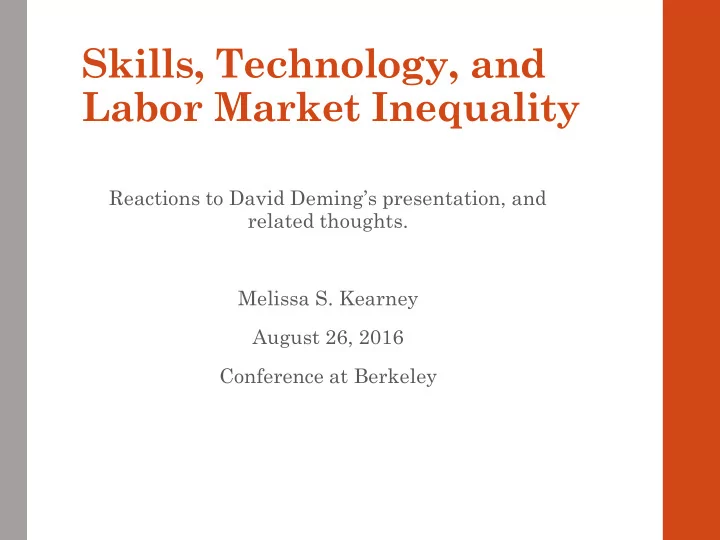

Skills, Technology, and Labor Market Inequality Reactions to David Deming’s presentation, and related thoughts. Melissa S. Kearney August 26, 2016 Conference at Berkeley
Demmings insights in broader context 1. How important is technology to understanding past wage/employment trends? To thinking about future wage/employment trends? Technology as a complement/replacement for skills/tasks What to expect from technology going forward 2. Supply of skill? 3. What does all this imply about the most effective policy response, in particular, role of education?
1. How important is technology to understanding trends? • College/HS wage premium roughly doubles 1979-2012 • Simple (incomplete) idea: tech enhances relative productivity of more educated workers Can’t explain earnings/employment polarization in 1990s Can’t explain real earnings decline of less educated workers Can’t explain shifting of mid -skill workers to low-$ occs • Task-based framework [Autor, Levy, Murnane (2003) framework, in Autor and Acemoglu (2011) among others]: • Information technology substitutes for routine tasks, complements abstract and manual tasks. Workers w/ comparative advantage in abstract and manual see wages rise, while those performing routing see wages fall.
Shifts in types of jobs, w/ resulting changes in earnings • <BA workers: shift to lower-paying occs, & earnings w/in occs fell. Shifts in occ explain [1/6, 2/5] of overall decline in MAE for <BA worker. And less likely to be working FTFY. • BA workers remained in high-paying occs and median earnings in those occupations rose. • Consistent with story about nuanced interactions between new technologies and the types of tasks performed by workers of different skill levels, within demand/supply framework. Important: does not preclude important role of institutions, immigration, trade, outsourcing.
Going forward? Adjustments, new jobs, uncertainty • Holzer : “New middle” – growth in new middle-wage jobs, such as paralegal, health technicians, retail managers • Deming (2016): STEM employment growth 2000-2012 uneven across jobs Rewards to high math/high social • TO CONSIDER : Who will possess those skills? “ D ivergent destinies” – McLahanan. Latest: Hillbilly Elegy Makes reliance on educational institutions more difficult
Going forward? Adjustments, new jobs, uncertainty • Very divergent views about technology/innovation: Gordon, Theil: out of good ideas Brynjolfsson/McAfee: Machine Age -> entrepreneurs • TO PONDER : Is it a problem of growth or redistribution? Utopian or dystopian future?
2. Deming on Skill Supply • Relative supply of college-educated has declined since 1982 (recent uptick) Increasing demand for college-educated since 1980; rate of demand has slowed since 2000, but still positive D/S consistent with Golden & Katz story of 20 th century • No obvious decline in pre-college cognitive measures of HS students since 1970s. RAISES QUESTION : why aren’t there more college graduates? Are there barriers to optimal investment, or role for low non- cognitive skills?
3. Education as policy response Agree with Deming: need more individuals to graduate from (good) colleges Counter claim: “But it won’t reduce inequality” • To some extent this is true, b/c a large share of earnings inequality occurs above the median, and changing college shares will not substantially affect those differences. Doesn’t address top 1%. • But, it would bring up the bottom. Simulation with Hershbein and Summers (2015): • Straightforward simulation of what would happen to distribution of earnings if one out of every 10 men age 25 – 64 who did not have a college degree were to obtain one (adjusting for GE wage effects). (“ Increasing Education: What It Will and Will Not Do for Earnings and Earnings Inequality ,” The Hamilton Project, March 30, 2015)
3. Education as policy response • Deming prescription -- good colleges and schools • Agree with call to modernize educational institutions at all levels to meet demands of labor market • In addition to changes in instructional focus, I’ll add -- Incentives to public and community colleges (carrots/sticks?) • Life long learning opportunities. Outdated model
3. Education as policy response And for fun (?) - I’d spend marginal dollar improving public and community colleges, rather than giving free tuition further up the income distribution • Low levels of completion among low-income students in particular • More than academic under-preparation (Ft. Worth college experiment with advising) Bang for buck speculation: Marginal completers > marginal enrolled > inframarginal completers
Final comment Of course, educational investments should be in addition to other policy levers to support workers. “False” debate pitting education investments against role of labor market institutions or safety net programs. Furthermore, skill upgrading is a long-term, optimistic proposition. Need to support workers through transition, as well as support those who can’t obtain higher level skills that command high wages.
Recommend
More recommend